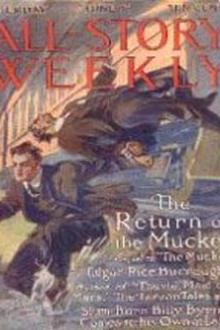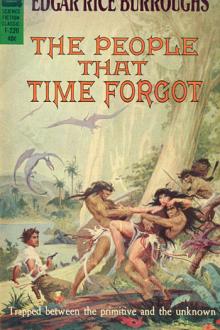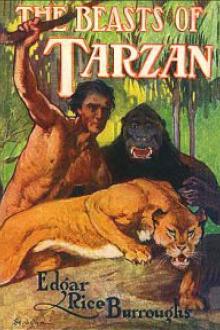The Return of the Mucker, Edgar Rice Burroughs [best affordable ebook reader txt] 📗

- Author: Edgar Rice Burroughs
- Performer: -
Book online «The Return of the Mucker, Edgar Rice Burroughs [best affordable ebook reader txt] 📗». Author Edgar Rice Burroughs
In a low tone Bridge crooned a snatch of the poem that he and Billy liked best:
And you, my sweet Penelope, out there somewhere you wait for me, With buds of roses in your hair and kisses on your mouth.
Bridge’s mental vision was concentrated upon the veranda of a white-walled ranchhouse to the east. He shook his head angrily.
“It’s just as well,” he thought. “She’s not for me.”
Something moved upon the ground beyond the window. Bridge became suddenly intent upon the thing. He saw it rise and resolve itself into the figure of a man, and then, in a low whisper, came a familiar voice:
“There ain’t no roses in my hair, but there’s a barker in my shirt, an’ another at me side. Here’s one of ‘em. They got kisses beat a city block. How’s the door o’ this thing fastened?” The speaker was quite close to the window now, his face but a few inches from Bridge’s.
“Billy!” ejaculated the condemned man.
“Surest thing you know; but about the door?”
“Just a heavy bar on the outside,” replied Bridge.
“Easy,” commented Billy, relieved. “Get ready to beat it when I open the door. I got a pony south o’ town that’ll have to carry double for a little way tonight.”
“God bless you, Billy!” whispered Bridge, fervently.
“Lay low a few minutes,” said Billy, and moved away toward the rear of the guardhouse.
A few minutes later there broke upon the night air the dismal hoot of an owl. At intervals of a few seconds it was repeated twice. The sentry before the guardhouse shifted his position and looked about, then he settled back, transferring his weight to the other foot, and resumed his bovine meditations.
The man at the rear of the guardhouse moved silently along the side of the structure until he stood within a few feet of the unsuspecting sentinel, hidden from him by the corner of the building. A heavy revolver dangled from his right hand. He held it loosely by the barrel, and waited.
For five minutes the silence of the night was unbroken, then from the east came a single shot, followed immediately by a scattering fusillade and a chorus of hoarse cries.
Billy Byrne smiled. The sentry resumed indications of quickness. From the barracks beyond the guardhouse came sharp commands and the sounds of men running. From the opposite end of the town the noise of battle welled up to ominous proportions.
Billy heard the soldiers stream from their quarters and a moment later saw them trot up the street at the double. Everyone was moving toward the opposite end of the town except the lone sentinel before the guardhouse. The moment seemed propitious for his attempt.
Billy peered around the corner of the guardhouse. Conditions were just as he had pictured they would be. The sentry stood gazing in the direction of the firing, his back toward the guardhouse door and Billy.
With a bound the American cleared the space between himself and the unsuspecting and unfortunate soldier. The butt of the heavy revolver fell, almost noiselessly, upon the back of the sentry’s head, and the man sank to the ground without even a moan.
Turning to the door Billy knocked the bar from its place, the door swung in and Bridge slipped through to liberty.
“Quick!” said Billy. “Follow me,” and turned at a rapid run toward the south edge of the town. He made no effort now to conceal his movements. Speed was the only essential, and the two covered the ground swiftly and openly without any attempt to take advantage of cover.
They reached Billy’s horse unnoticed, and a moment later were trotting toward the west to circle the town and regain the trail to the north and safety.
To the east they heard the diminishing rifle fire of the combatants as Pesita’s men fell steadily back before the defenders, and drew them away from Cuivaca in accordance with Billy’s plan.
“Like takin’ candy from a baby,” said Billy, when the flickering lights of Cuivaca shone to the south of them, and the road ahead lay clear to the rendezvous of the brigands.
“Yes,” agreed Bridge; “but what I’d like to know, Billy, is how you found out I was there.”
“Penelope,” said Byrne, laughing.
“Penelope!” queried Bridge. “I’m not at all sure that I follow you, Billy.”
“Well, seein’ as you’re sittin’ on behind you can’t be leadin’ me,” returned Billy; “but cuttin’ the kid it was a skirt tipped it off to me where you was—the beautiful senorita of El Orobo Rancho, I think Jose called her. Now are you hep?”
Bridge gave an exclamation of astonishment. “God bless her!” he said. “She did that for me?”
“She sure did,” Billy assured him, “an’ I’ll bet an iron case she’s awaitin’ for you there with buds o’ roses in her hair an’ kisses on her mouth, you old son-of-a-gun, you.” Billy laughed happily. He was happy anyway at having rescued Bridge, and the knowledge that his friend was in love and that the girl reciprocated his affection—all of which Billy assumed as the only explanation of her interest in Bridge—only added to his joy. “She ain’t a greaser is she?” he asked presently.
“I should say not,” replied Bridge. “She’s a perfect queen from New York City; but, Billy, she’s not for me. What she did was prompted by a generous heart. She couldn’t care for me, Billy. Her father is a wealthy man—he could have the pick of the land—of many lands—if she cared to marry. You don’t think for a minute she’d want a hobo, do you?”
“You can’t most always tell,” replied Billy, a trifle sadly. “I knew such a queen once who would have chosen a mucker, if he’d a-let her. You’re stuck on her, ol’ man?”
“I’m afraid I am, Billy,” Bridge admitted; “but what’s the use? Let’s forget it. Oh, say, is this the horse I let you take the night you robbed the bank?”
“Yes,” said Billy; “same little pony, an’ a mighty well-behaved one, too. Why?”
“It’s hers,” said Bridge.
“An’ she wants it back?”
“She didn’t say so; but I’d like to get it to her some way,” said Bridge.
“You ride it back when you go,” suggested Billy.
“But I can’t go back,” said Bridge; “it was Grayson, the foreman, who made it so hot for me I had to leave. He tried to arrest me and send me to Villa.”
“What for?” asked Billy.
“He didn’t like me, and wanted to get rid of me.” Bridge wouldn’t say that his relations with Billy had brought him into trouble.
“Oh, well, I’ll take it back myself then, and at the same time I’ll tell Penelope what a regular fellow you are, and punch in the foreman’s face for good luck.”
“No, you mustn’t go there. They know you now. It was some of El Orobo’s men you shot up day before yesterday when you took their steers from them. They recognized the pony, and one of them had seen you in Cuivaca the night of the robbery. They would be sure to get you, Billy.”
Shortly the two came in touch with the retreating Pesitistas who were riding slowly toward their mountain camp. Their pursuers had long since given up the chase, fearing that they might be being lured into the midst of a greatly superior force, and had returned to Cuivaca.
It was nearly morning when Bridge and Billy threw themselves down upon the latter’s blankets, fagged.
“Well, well,” murmured Billy Byrne; “li’l ol’ Bridgie’s found his Penelope,” and fell asleep.
CAPTAIN BILLY BYRNE rode out of the hills the following afternoon upon a pinto pony that showed the whites of its eyes in a wicked rim about the iris and kept its ears perpetually flattened backward.
At the end of a lariat trailed the Brazos pony, for Billy, laughing aside Bridge’s pleas, was on his way to El Orobo Rancho to return the stolen horse to its fair owner.
At the moment of departure Pesita had asked Billy to ride by way of Jose’s to instruct the old Indian that he should bear word to one Esteban that Pesita required his presence.
It is a long ride from the retreat of the Pesitistas to Jose’s squalid hut, especially if one be leading an extra horse, and so it was that darkness had fallen long before Billy arrived in sight of Jose’s. Dismounting some distance from the hut, Billy approached cautiously, since the world is filled with dangers for those who are beyond the law, and one may not be too careful.
Billy could see a light showing through a small window, and toward this he made his way. A short distance from Jose’s is another, larger structure from which the former inhabitants had fled the wrath of Pesita. It was dark and apparently tenantless; but as a matter of fact a pair of eyes chanced at the very moment of Billy’s coming to be looking out through the open doorway.
The owner turned and spoke to someone behind him.
“Jose has another visitor,” he said. “Possibly this one is less harmless than the other. He comes with great caution. Let us investigate.”
Three other men rose from their blankets upon the floor and joined the speaker. They were all armed, and clothed in the nondescript uniforms of Villistas. Billy’s back was toward them as they sneaked from the hut in which they were intending to spend the night and crept quietly toward him.
Billy was busily engaged in peering through the little window into the interior of the old Indian’s hovel. He saw an American in earnest conversation with Jose. Who could the man be? Billy did not recognize him; but presently Jose answered the question.
“It shall be done as you wish, Senor Grayson,” he said.
“Ah!” thought Billy; “the foreman of El Orobo. I wonder what business he has with this old scoundrel—and at night.”
What other thoughts Billy might have had upon the subject were rudely interrupted by four energetic gentlemen in his rear, who leaped upon him simultaneously and dragged him to the ground. Billy made no outcry; but he fought none the less strenuously for his freedom, and he fought after the manner of Grand Avenue, which is not a pretty, however effective, way it may be.
But four against one when all the advantages lie with the four are heavy odds, and when Grayson and Jose ran out to investigate, and the ranch foreman added his weight to that of the others Billy was finally subdued. That each of his antagonists would carry mementos of the battle for many days was slight compensation for the loss of liberty. However, it was some.
After disarming their captive and tying his hands at his back they jerked him to his feet and examined him.
“Who are you?” asked Grayson. “What you doin’ sneakin’ ‘round spyin’ on me, eh?”
“If you wanna know who I am, bo,” replied Billy, “go ask de Harlem Hurricane, an’ as fer spyin’ on youse, I wasn’t; but from de looks I guess youse need spyin, yuh tinhorn.”
A pony whinnied a short distance from the hut.
“That must be his horse,” said one of the Villistas, and walked away to investigate, returning shortly after with the pinto pony and Brazos.
The moment Grayson saw the latter he gave an exclamation of understanding.
“I know him now,” he said. “You’ve made a good catch, Sergeant. This is the fellow who robbed the bank at Cuivaca. I recognize him from the descriptions I’ve had of him, and the fact that he’s got the Brazos pony makes it a cinch. Villa oughter promote you for this.”
“Yep,” interjected Billy, “he orter make youse an admiral at least; but youse ain’t





Comments (0)